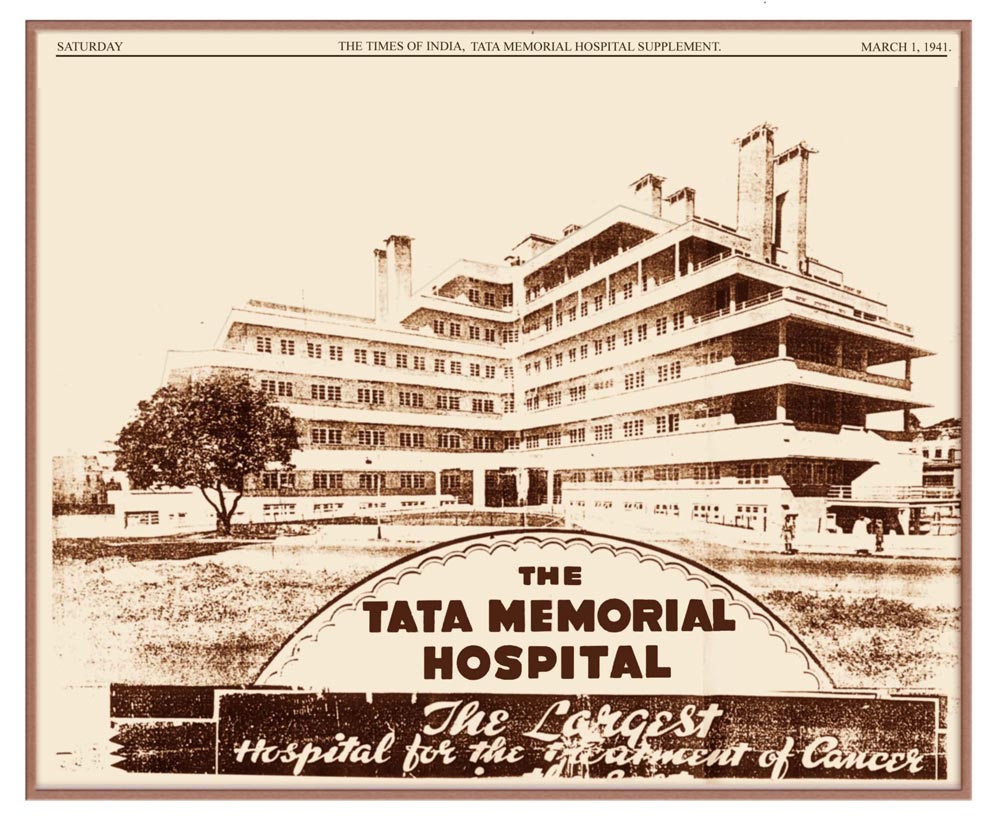
LEGACY OF CANCER CARE
We are the unit of the Tata Memorial Centre (TMC), Mumbai. Tata Memorial Centre has a legacy of leadership in cancer care, research, and education in India.
COMPREHENSIVE CANCER CARE INCLUDING DIAGNOSIS AND MULTI-MODALITY MANAGEMENT UNDER ONE ROOF
STATE OF ART FACILITIES

History
The Tata Memorial Hospital was initially commissioned by the Sir Dorabji Tata Trust on 28 February, 1941 as a center with enduring value and a mission for concern for the Indian people. In 1952, the Indian Cancer Research Centre was established as a pioneer research institute for basic research – later called the Cancer Research Institute (CRI). In 1957, the Ministry of Health temporarily took over the Tata Memorial Hospital. The transfer of the administrative control of the Tata Memorial Centre (Tata Memorial Hospital and Cancer Research Institute) to the Department of Atomic Energy in 1962 was the next major milestone. This was due to the foresight and the vision of Dr. Homi Jehangir Bhabha, who envisaged the major role that radiation would play in cancer treatment -from imaging to staging and actual therapy. The TMH and CRI merged as the two arms of the Tata Memorial Centre (TMC) in 1966 represented a classic example of private philanthropy augmented by Government support, with a mandate for Service, Education and Research in cancer.
Homi Bhabha Cancer Hospital (HBCH) and Mahamana Pandit Madan Mohan Malaviya Cancer Centre (MPMMCC), Varanasi are the units of Tata Memorial Centre, Mumbai (Grant-in-Aid Institution of Department of Atomic Energy, Government of India). Both HBCH and MPMMCC were formally inaugurated by Hon’ble Prime Minister, Shri Narendra Modi Ji on Tuesday, the 19th February 2019, in the presence of the Hon’ble Governor of Uttar Pradesh, Shri Ram Naik, Hon’ble Chief Minister of Uttar Pradesh, Shri Yogi Adityanath; the Secretary, Department of Atomic Energy, Govt. of India, Dr. K.N. Vyas; Head, Tata Trusts, Shri Ratan Tata; the Director Tata Memorial Centre, Dr. R.A. Badwe and Vice Chancellor (Banaras Hindu University), Dr. Rakesh Bhatnagar.
HBCH has been named in honor of Dr. Homi Jehangir Bhabha (1909-1966), an Indian Nuclear Physicist and Founder Director of the Atomic Energy Establishment (now called as Bhabha Atomic Research Centre), who strived to promote nuclear power programs in India. He was awarded the Padma Bhushan in 1954. He was also nominated for the prestigious Nobel Prize for Physics in 1951 and 1953-1956.
MPMMCC has been named in honor of Mahamana Pandit Madan Mohan Malaviya (1861-1946), an Indian educationalist, who strived to promote modern education among Indians and eventually co-founded the Banaras Hindu University (BHU) at Varanasi in 1916. Malaviyaji was a multifaceted personality- he was a great patriot, a visionary, social reformer, a passionate journalist, a successful lawyer and an outstanding parliamentarian and statesman. He was the Vice Chancellor of the Banaras Hindu University from 1919 to 1938. In his lifetime, Banaras Hindu University came to be known as a Capital of Knowledge across India and abroad.
HBCH, the erstwhile Indian Railway Cancer Hospital, was renovated by Tata Memorial Centre with the help of Tata Trusts and was made functional from 1st May 2018. MPMMCC was created as a green field project and constructed from scratch in a record time of 10 months between April 2018 to February 2019. Tata Trusts supported the construction of entire building and the equipment and manpower support were provided by Department of Atomic Energy, Govt. of India.
The distance between MPMMCC, Varanasi and HBCH, Varanasi is about 8 kilometers with driving time of 20 minutes. There is very good road connectivity between the two hospitals. Both MPMMCC and HBCH are working as complementary units under the administrative control of Director, HBCH & MPMMCC, Varanasi.
HBCH, Varanasi is the banner under which all academic programs are registered and running. However both HBCH and MPMMCC, Varanasi are responsible for running the cancer care services, academic programs and oncology-related research work. The number of beds at HBCH and MPMMCC are 179 and 352, respectively. Both the hospitals complement each other in terms of oncology services. Pediatric, Bone and Soft Tissue and Hematolymphoid malignancies are treated at HBCH.All the remaining solid tumor malignancies are treated at MPMMCC.
Copyright © 2026 HBCH & MPMMCC, Varanasi Last Updated on : 12-February-2026